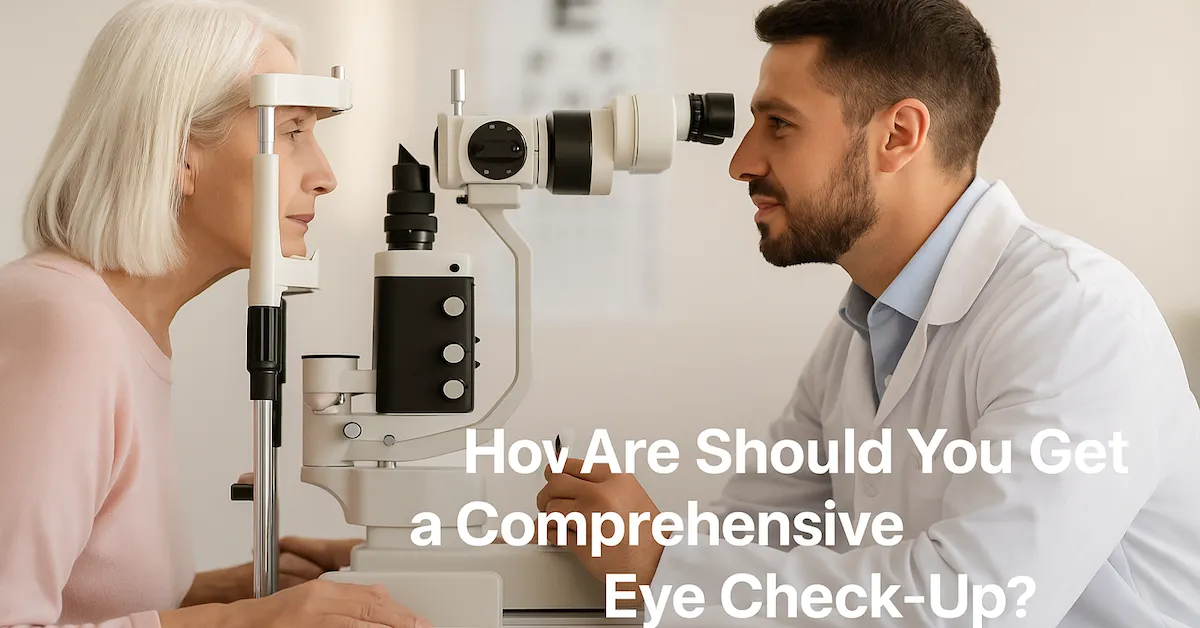
How Often Should You Get a Comprehensive Eye Check-Up?
Eye health is something many people take for granted until problems arise. While vision changes are often noticeable, many eye diseases develop silently and without symptoms in the early stages. That’s why regular eye check-ups are essential for protecting your vision. But how often should you schedule a comprehensive eye exam? The answer depends on your age, health history, and risk factors. In this article, we’ll explain the recommended guidelines and why routine exams are so important.
What Is a Comprehensive Eye Check-Up?
A comprehensive eye check-up goes beyond a simple vision screening. Unlike the quick tests you might take at a school or workplace, these exams evaluate the overall health of your eyes.
A full exam may include:
Visual acuity test: Measures how clearly you can see at different distances.
Refraction test: Determines your exact prescription for glasses or contacts.
Slit-lamp exam: Uses a special microscope to examine structures at the front of the eye.
Dilated eye exam: Allows the doctor to check the retina and optic nerve.
Eye pressure test: Screens for glaucoma.
This level of detail helps detect eye conditions early, when treatment is often most effective.
Recommended Eye Exam Frequency by Age
The frequency of eye exams varies depending on your age group:
Children: The first exam is recommended at 6 months old, followed by another at age 3, and again before starting school. School-aged children should have exams every 1–2 years to detect vision issues that can affect learning.
Adults under 40: Healthy adults with no vision problems should schedule an exam every 2–3 years.
Adults 40–60: Eye exams should be done every 1–2 years, since the risk of age-related eye conditions begins to rise.
Adults over 60: Annual eye exams are strongly recommended to catch issues like glaucoma, cataracts, and macular degeneration early.

Who Needs More Frequent Exams?
Some people are at higher risk for vision problems and should have exams more often than the general guidelines suggest. These include:
Individuals with diabetes or high blood pressure.
People with a family history of glaucoma or macular degeneration.
Those who wear contact lenses, since they require ongoing monitoring.
Patients who have had previous eye surgeries or injuries.
For these groups, annual check-ups or even more frequent visits may be necessary.
What Conditions Can Regular Eye Exams Detect?
One of the main reasons eye exams are so important is their ability to detect diseases early, sometimes before symptoms appear. Conditions that can be diagnosed include:
Glaucoma: Often called the “silent thief of sight,” it can cause irreversible damage if untreated.
Cataracts: Clouding of the lens that can gradually reduce vision.
Macular degeneration: A leading cause of vision loss in older adults.
Diabetic retinopathy: Damage to blood vessels in the retina caused by diabetes.
Hypertension-related changes: Eye exams can reveal signs of high blood pressure or other systemic conditions.
By catching these issues early, patients can often prevent or minimize vision loss.
Benefits of Regular Eye Exams
Beyond detecting diseases, comprehensive eye exams offer several benefits:
Clearer vision: Updated prescriptions for glasses or contact lenses improve daily comfort.
Peace of mind: Knowing your eyes are healthy reduces worry about potential problems.
Overall health insight: Eye doctors can sometimes detect signs of systemic illnesses like diabetes or high blood pressure before other symptoms appear.
Conclusion
The right frequency for comprehensive eye check-ups depends on your age, health, and risk factors. For most adults, exams every 1–2 years are sufficient, while children, seniors, and those with medical conditions may need them more often. Regular check-ups not only help preserve your vision but also contribute to your overall well-being.
At Bellasee, we provide comprehensive eye exams tailored to your individual needs. Our team uses advanced technology to detect issues early and ensure your eyes stay healthy for years to come.